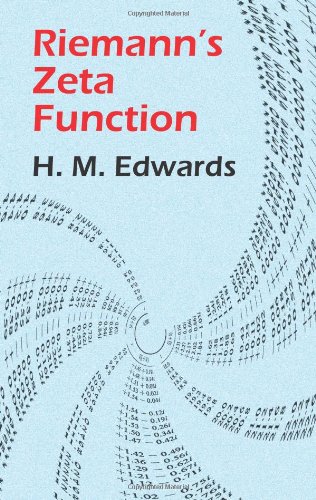Riemann's Zeta Function book
Par gregory mark le mardi, avril 26 2016, 10:26 - Lien permanent
Riemann's Zeta Function. H. M. Edwards

Riemann.s.Zeta.Function.pdf
ISBN: 0122327500,9780122327506 | 331 pages | 9 Mb

Riemann's Zeta Function H. M. Edwards
Publisher: Academic Press Inc
The answer I got: You should use the Riemann zeta function with power 2. In other words, the study of analytic properties of Riemann's {\zeta} -function has interesting consequences for certain counting problems in Number Theory. L -functions are certain meromorphic functions generalizing the Riemann zeta function. Riemann's ten-page-long paper “Über die Anzahl der Primzahen unter einer gegebener Gröβe” has great influence on modern number theory. Riemann zeta function is a rather simple-looking function. The Riemann Hypothesis is not based on the Euler product." I disagree and let me explain why: Golden key is not Euler product. They are typically defined by what is called an L -series which is then meromorphically extended to the complex plane. On frequent universality of Riemann zeta function and an answer to the Riemann Hypothesis [INOCENTADA]. The primes are the primes; $\zeta(s) = \sum_{n=1}^{\infty} n^{-s}$ is the Riemann zeta function. I asked my nerd friend what pi-related thing I should make into a pie form. But right in the middle there is a discussion of Bernhard Riemann's zeta function, which in my (albeit layman's understanding) is concerned with predicting the distribution of prime numbers. My latest math work links prime numbers to the Pareto distribution. This function is linked to many phenomena in nature. We recover the classical Riemann zeta function, and taking the ring of integers of a number field recovers the zeta function of a number field. $\zeta(2)$ is the sum of the reciprocals of the square numbers, which is $\frac{\pi^2}{6}$ thanks to Euler. What happens if we take {X} to be a variety over a finite field {\mathbb{F}_q} ? Lectures on The Riemann Zeta-Function - free book at E-Books Directory - download here. Primes also have a link to quantum phenomena via the Riemann Zeta function. For any number s , the zeta function \zeta(s) is the sum of the reciprocals of all natural numbers raised to the s^\mathrm{th} power.
Introduction to Biometrics pdf download